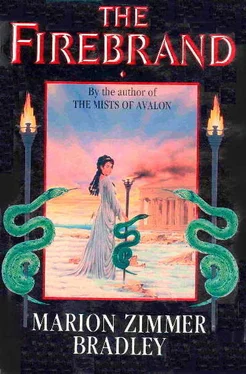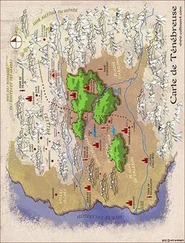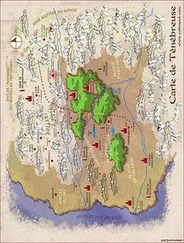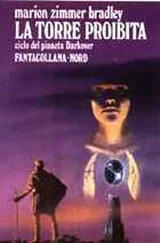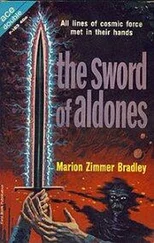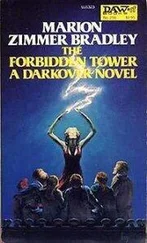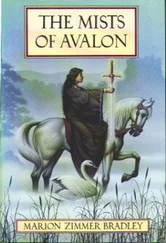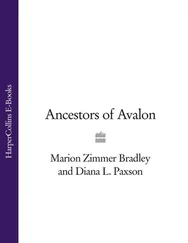Marion Bradley - The Firebrand
Здесь есть возможность читать онлайн «Marion Bradley - The Firebrand» весь текст электронной книги совершенно бесплатно (целиком полную версию без сокращений). В некоторых случаях можно слушать аудио, скачать через торрент в формате fb2 и присутствует краткое содержание. Жанр: Фантастика и фэнтези, на английском языке. Описание произведения, (предисловие) а так же отзывы посетителей доступны на портале библиотеки ЛибКат.
- Название:The Firebrand
- Автор:
- Жанр:
- Год:неизвестен
- ISBN:нет данных
- Рейтинг книги:3 / 5. Голосов: 1
-
Избранное:Добавить в избранное
- Отзывы:
-
Ваша оценка:
- 60
- 1
- 2
- 3
- 4
- 5
The Firebrand: краткое содержание, описание и аннотация
Предлагаем к чтению аннотацию, описание, краткое содержание или предисловие (зависит от того, что написал сам автор книги «The Firebrand»). Если вы не нашли необходимую информацию о книге — напишите в комментариях, мы постараемся отыскать её.
The Firebrand — читать онлайн бесплатно полную книгу (весь текст) целиком
Ниже представлен текст книги, разбитый по страницам. Система сохранения места последней прочитанной страницы, позволяет с удобством читать онлайн бесплатно книгу «The Firebrand», без необходимости каждый раз заново искать на чём Вы остановились. Поставьте закладку, и сможете в любой момент перейти на страницу, на которой закончили чтение.
Интервал:
Закладка:
Marion Zimmer Bradley
The Firebrand
ACKNOWLEDGMENTS
I wish to acknowledge especially the help of my husband, Walter Breen, who assisted materially in the research, and whose knowledge of classical Greek - both language and history - was an invaluable help in creating this story, particularly including the quotation from the Athens museum which will be found in the postscript, providing historical basis for the—fate and the very historical existence—of Kassandra of Troy, from whose viewpoint this story is told.
Readers will be likely to bring challenges; ' That's not the way it happened in the Iliad.' Of course not; had I been content with the account in the Iliad, there would have been no reason to write a novel. Besides, the Iliad stops short just at the most interesting point, leaving the writer to conjecture about the end from assorted legends and traditions. If the writers of Greek drama felt free to improvise, I need not apologise for following their excellent example.
One further apology: Walter's knowledge of the language persuaded me, in the name of linguistic 'correctness' and rather against my better judgement, to use classical transliterations rather than the more familiar Latinised forms; hence Akhaians for Achaeans (the term Greek was not known then), Akhilles or Akhilleus for Achilles and, worst of all, Kassandra for Cassandra. To me the difference is appalling and changes the whole meaning of the name and character. A cow or a crow would not, after all, be the same creature if called a kow or a krow. To those whose visual aesthetics are as acute as mine, and to whom the look of a name on the page alters its very essence, I can only express my apologies. Linguistics and aesthetics are, after all, very different things, and the argument between them will never be solved - at least not by me.
I also acknowledge my debt to Elisabeth Waters, who on many occasions when I was 'stuck' with the 'what happens next' blues, never failed to help me find the most constructive answer, and to the other members of my household who suffered all through the fall and the sack of Troy with me.
Marion Zimmer Bradley
VOLUME ONE : Apollo's Call
PROLOGUE
The rain had been coming down all day; now heavy, now tapering off to showers but never entirely stopping. The women carried their spinning indoors to the hearth and even the children huddled under the overhanging roofs of the courtyard, venturing out for a few minutes between showers to splash through the brick-lined puddles and track the mud inside to the hearthside. By evening the oldest of the women by the hearth thought she might go mad with the shrieking and splashing, the charging of the little armies, the bashing of wooden swords on wooden shields, the splintering sounds and quarrelling over the broken toys, the shifting of loyalties from leader to leader, the yells of the 'killed' and 'wounded' when they were put out of the game. Too much rain was still coming down the chimney for proper cooking at the hearth; as the winter day darkened, fires were lighted in braziers. As the baking meat and bread began to smell good, the children one after another came and hunched down like hungry puppies, sniffing loudly and still quarrelling in undertones. Shortly before dinner a guest arrived at the door; a minstrel, a wanderer whose lyre strapped to his shoulder guaranteed him welcome and lodging everywhere. When he had been given food and a bath and dry clothing, the minstrel came and sat in the seat reserved for the most welcome guests, close to the fire. He began to tune his instrument, leaning his ear close to the tortoise-shell pegs and testing the sound with his finger. Then, without asking leave—even in these days a bard did as he chose—he strummed a single loud chord and declaimed:
"I will sing of battles and of the great men who fought them;
Of the men who lingered ten years before the giant-builded walls of Troy;
And of the Gods who pulled down those walls at last, of Apollo Sunlord and Poseidon the mighty Earthshaker;
I will sing the tale of the anger of powerful Akhilles;
Born of a Goddess. So mighty no weapon could slay him;
Even the story of his overweening pride, and that battle
Where he and great Hector fought for three days on the plains before high-walled Troy;
Of proud Hector and gallant Akhilles, of Kentaurs and Amazons, Gods and heroes,
Odysseus and Aeneas, all those who fought and were slain on the plains before Troy—"
"No!" the old woman exclaimed sharply, letting her spindle drop and springing up, "I won't have it! I'll not hear that nonsense sung in my hall!"
The minstrel let his hand fall over the strings with a jangling dissonance; his look was one of dismay and surprise, but his tone was polite.
"My lady?"
"I tell you I won't have those stupid lies sung here at my hearth!" she said vehemently.
The children made disappointed sounds; she gestured them imperiously to silence. "Minstrel, you are welcome to your meal and to a seat by my fire; but I won't have you filling the children's ears with that lying nonsense. It wasn't like that at all."
"Indeed?" the harper inquired, still politely. "How do you know this, madam? I sing the tale as I learned it from my master, as it is sung everywhere from Crete to Colchis—"
"It may be sung that way, from here to the very end of the world," the old woman said, "but it didn't happen that way at all."
"How do you know that?" asked the minstrel.
"Because I was there, and I saw it all," replied the old woman.
The children murmured and cried out.
"You never told us that, grandmother. Did you know Akhilles, and Hector, and Priam, and all the heroes?"
"Heroes!" she said scornfully. "Yes, I knew them; Hector was my brother."
The minstrel bent forward and looked sharply at her.
"Now I know you," he said at last.
She nodded and bent her white head forward.
"Then perhaps, Lady, you should tell the story; I who serve the God of Truth would not sing lies for all men to hear."
The old woman was silent for a long time. At last she said, "No; I cannot live it all again." The children whined with disappointment. "Have you no other tale to sing?"
"Many," said the harper, "but I wish not to tell a story you mock as a lie. Will you not tell the truth that I may sing it elsewhere?"
She shook her head firmly.
"The truth is not so good a story."
"Can you not at least tell me where my story goes astray that I may amend it?"
She sighed. "There was a time when I would have tried," she said, "but no man wishes to believe the truth. For your story speaks of heroes and kings, not queens; and of Gods, not Goddesses."
"Not so," said the harper, "for much of the story speaks of the beautiful Helen, who was stolen away by Paris; and of Leda, the mother of Helen and her sister Klytemnestra, who was seduced by great Zeus who took the form of her husband the King—"
"I knew you could not understand," the old woman said, "for to begin, at first in this land there were no Kings, but only Queens; the daughters of the Goddesses, and they took consorts where they would. And then the worshippers of the Sky Gods, the horse folk, the users of iron, came down into our country; and when the Queens took them as consorts, they called themselves Kings and demanded the right to rule. And so the Gods and the Goddesses were in strife; and a time came when they brought their quarrels to Troy—" Abruptly she broke off.
"Enough," she said. "The world has changed; already I can tell you think me an old woman whose wits wander. This has been my destiny always: to speak truth and never to be believed. So it has been, so it will ever be. Sing what you will; but mock not my own truth on my own hearth. There are tales enough. Tell us about Medea, Lady of Colchis, and the golden fleece which Jason stole from her shrine - if he did; I dare say there is some other truth to that tale too; but I neither know it, nor care what the truth may be; I have not set foot in Colchis for many long years." She picked up her spindle and quietly began to spin.
Читать дальшеИнтервал:
Закладка:
Похожие книги на «The Firebrand»
Представляем Вашему вниманию похожие книги на «The Firebrand» списком для выбора. Мы отобрали схожую по названию и смыслу литературу в надежде предоставить читателям больше вариантов отыскать новые, интересные, ещё непрочитанные произведения.
Обсуждение, отзывы о книге «The Firebrand» и просто собственные мнения читателей. Оставьте ваши комментарии, напишите, что Вы думаете о произведении, его смысле или главных героях. Укажите что конкретно понравилось, а что нет, и почему Вы так считаете.
